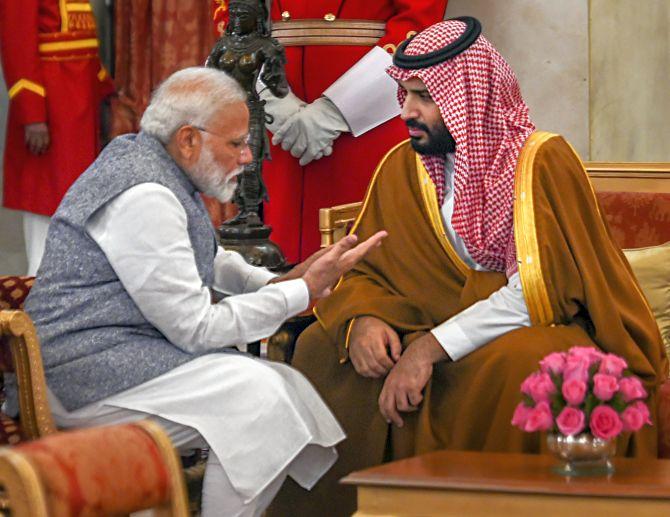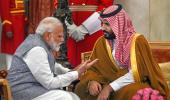'Wouldn't the Saudi leadership know that King Salman's decision would upset India?'
'Nonetheless, the Saudis estimate that Pakistan's importance by far outweighs the dalliance with India,' notes Ambassador M K Bhadrakumar.

Saudi Foreign Minister Prince Faisal bin Farhan bin Abdullah's one-day visit to Islamabad on December 26 aimed at a reset of the Saudi-Pakistani relationship.
What emerges is that Saudis are going the extra league to placate Pakistan.
The Modi government must take note.
To recap, things came to a pass in September when, following the Modi government's historic move to 'integrate' J&K, Pakistan mooted the idea of an Islamic conference with Turkey and Malaysia to highlight the Kashmir issue in the face of Saudi Arabia's lukewarm attitude.
That initiative by Prime Minister Imran Khan eventually took the form of the Kuala Lumpur Summit 2020 in the Malaysian capital on December 19-21 with a broader agenda to choreograph a new pathway for the Muslim world in the contemporary world situation.
Unsurprisingly, Saudi Arabia assessed that the Malaysian initiative would pose a challenge to its leadership of the ummah.
Saudi King Salman took exception in a phone call to Malaysian Prime Minister Mahathir Mohammed on the eve of the KL summit to complain that the Organisation of Islamic Countries ought to have been the right forum to deal with Islamic issues.
Furthermore, the Saudis prevailed upon Pakistan Prime Minister Imran Khan to stand down from the KL summit. This was how Turkish President Recep Erdoğan later recapitulated the high drama:
'Unfortunately, we see that Saudi Arabia pressures Pakistan. Now, there are promises that the country has given to Pakistan regarding the central bank. However, more than that, there are 4 million Pakistanis working in Saudi Arabia. They (threaten by saying that they) would send (the Pakistanis) back and re-employ Bangladeshi people instead.'
According to Erdogan (external link), due to its economic difficulties, Pakistan had to submit to such threats.
Pakistan, of course, has denied any such Saudi pressure.
Indeed, the Saudis are well aware that their lukewarm attitude on the Kashmir issue has left scars on the Saudi-Pak relationship.
In fact, there has since been a discernible upswing in Pakistan's relations with Iran.
The point is, at the present juncture of regional politics, the Saudis simply cannot afford their leadership of the ummah to be challenged when there is a concerted Turkey-Iran-Qatar axis at work in the Muslim Middle East undermining the prestige of the Saudi regime, and Saudi confidence in the US as provider of security is badly shaken.
It is against this backdrop that Prince Faisal brought with him to Islamabad a most generous gift to assuage Pakistani sentiments -- King Salman's decision to convene a special meeting of OIC foreign ministers to discuss Kashmir (external link).
In an extraordinary gesture, this event will be held in Islamabad in April.
Wouldn't the Saudi leadership know that King Salman's decision would upset India? Nonetheless, the Saudis estimate that Pakistan's importance by far outweighs the dalliance with India.
Without doubt, this development comes as a big setback to Indian diplomacy and the Modi government's Persian Gulf strategies.
A question mark must be put now on the expected investment plans by Saudi Aramco in the $70 billion mega petrochemical plant (originally planned to be set up in Ratnagiri).
Clearly, in the context of the present-day upheaval in India following the Citizenship (Amendment) Act, which has a pronounced anti-Muslim thrust, the Saudis will go slow on ties with India.
Over and above, it emerges that any shift in the Saudi stance on Kashmir in India's favour is simply out of the question.

Meanwhile, the Modi government also made a serious mistake by taking sides in Saudi-Iranian rivalries.
Acting under the foolish notion that a warming up of ties with Saudi Arabia (and the UAE) necessitated a cooling down of relations with Iran, the Modi government put on the back burner the strategic partnership with Iran.
The Saudi u-turn, therefore, also means that India must rush to Tehran in sackcloth and ashes. What a mess-up!
This level of incompetence and intellectual bankruptcy at the leadership level in Delhi in policymaking in regard of what India calls its 'extended neighbourhood' has no parallel in recent times.
How is it that countries such as Russia, China, Japan, South Korea or Malaysia manage to have friendly relations with both Saudi Arabia and Iran? Neither Saudi Arabia nor Iran demands an exclusive relationship with any country.
Saudi Arabia is in historic transition.
The Kuala Lumpur summit has come as a reality check to the Saudi regime.
The message out of the KL summit is that Saudi Arabia not only failed to lead the Islamic world, but lacks leadership quality at a time when the Muslim world has come under severe pressure and faces many challenges and Islam needs rejuvenation.
This is where Pakistan, a major Muslim country, becomes a crucial ally (external link).
Saudi Crown Prince Mohammed bin Salman has a warm personal friendship with Imran Khan and intends to preserve it.
The very fact that Imran Khan stayed out of the KL summit in deference to Saudi concerns underscores that despite Riyadh's perceived 'tilt' in favour of India on the Kashmir issue, Pakistan still remains eager to nurture fraternal ties with Saudi Arabia.
Faisal's mission to Islamabad aimed at reassuring the Pakistani leadership of Saudi support on the Kashmir issue.
The upheaval over the Citizenship (Amendment) Act and the National Register of Citizens will only further complicate India's relations with the Muslim world.
Indian diplomacy faces a difficult period ahead.
With Modi's international image seriously damaged -- perhaps, irrecoverably -- and Indian foreign policy finding itself in drift due to the aberrations of the Hindu nationalist government in power, we move on to the New Year in a depressing scenario.
Ambassador M K Bhadrakumar served the Indian Foreign Service officer for more than 29 years. He has served as India's ambassador to Turkey and Uzbekistan and has been a contributor to Rediff.com for well over a decade.










